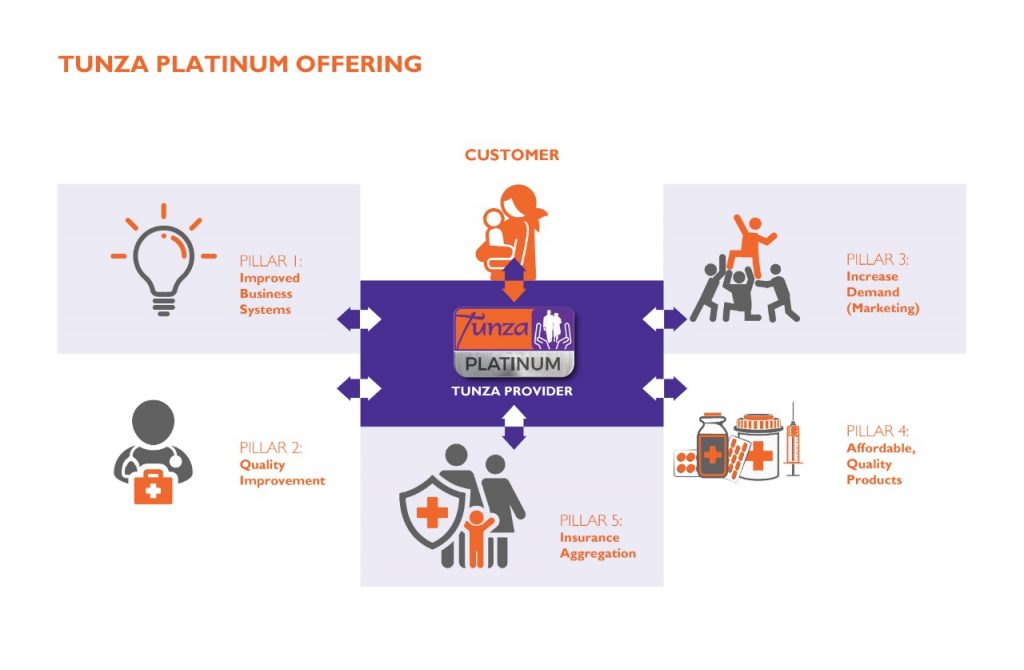The Tunza Family Health Network was established in December 2008 to serve vulnerable and underserved populations in Kenya. The network comprised select medical practitioners who had an existing and licensed private practice offering primary health care services to the community.
Population Services Kenya (PS Kenya) used a social franchising model by entering into contractual agreements with health providers to deliver a specified package of franchised services and value propositions in accordance with franchise standards under a common brand.
The network then had a membership of 415 privately owned clinics across Kenya’s 47 counties.
Family Planning, with a focus on the more cost-effective, long-term, and reversible methods such as intrauterine devices (IUCDs) and implants, was the flagship of Tunza services after inception. However, with time, PS Kenya integrated other services into the network; these included Cervical Cancer Screening and Preventative Treatment (CCS&PT), Safe Motherhood, HIV Testing and Counseling (HTC), HIV Care and Treatment, Integrated Management of Childhood Illnesses – IMCI (Malaria, Diarrhea, Pneumonia), Immunization, Tuberculosis screening and treatment, Hypertension, and Voluntary Male Medical Circumcision (VMMC).
The Tunza network had a dedicated Social Behavior Change Communications (SBCC) team of over 100 Community Health Workers (CHWs) commonly referred to as Tunza Mobilizers (TMs). Their mandate was to create a robust and informed demand for the franchise by mainly targeting women of reproductive age individually or through small group sessions to educate them on PS Kenya’s supported health areas and refer to franchised clinics. The Tunza Mobilizers were recruited, trained, and supervised by PS Kenya’s Communication staff.
PS Kenya used a two-pronged approach in ensuring that providers met and continuously improved on the quality of care offered to clients. At a macro level, Tunza supported the provider to holistically improve clinic quality. Since 2019, PS Kenya introduced the government-owned Kenya Quality for Health Model (KQMH) as the principal quality assurance framework for quality improvement within the franchise. The Kenya Quality Model for Health was defined as a conceptual framework for guiding and supporting coordination in an integrated manner, efforts, and investments aimed at improving the quality of healthcare in Kenya. At a micro level: Tunza worked with providers to help them enhance proficiency in service delivery by ensuring that franchised services were offered in accordance with National guidelines and Standard Operating Procedures (SOPs.
The Government of Kenya aspires to achieve universal coverage by 2030 and the National Health Insurance Fund (NHIF) plays a pivotal role in taking this agenda forward. To this end, PS Kenya has worked closely with NHIF to ensure that Tunza franchised facilities receive NHIF accreditation status. Currently over 50% of the Tunza network is accredited and offers services to over 480,000 NHIF members registered with Tunza for out-patient care. On the demand side, PS Kenya has continued to support the NHIF marketing team to educate and enroll customers to their health micro insurance products, especially Supa Cover and Linda Mama.
PS Kenya worked with franchised facilities to offer business training and support. The key objective of that program was to support health providers in becoming better business managers and to grow their health practices through Tunza Exclusive Franchise Benefits. The program was designed to extend health systems’ strengthening interventions and financing to complement their quality improvement plans, upgrade their equipment and infrastructure, and increase the scope of services offered.
Using a Social Enterprise model, PS Kenya and PSI jointly sought to evolve classic social franchising that was donor-reliant to a more sustainable model. In 2018, PS Kenya commenced work on the social enterprise, and 65 facilities registered interest to join the new model. Branded as Tunza Platinum, PS Kenya’s vision for the social enterprise was to sustainably deepen access to quality and affordable health services by bringing together three critical players; healthcare consumers, private health providers, and insurance organizations (NHIF/private). At the core of Tunza Platinum was ensuring that the poor had access to affordable payment mechanisms and could seek care in private facilities.

As part of Tunza Platinum, PS Kenya introduced an automated Clinic Management System (CMS), which 39 facilities purchased and installed. The principal objective of installing the CMS was to help clinics increase client volumes and revenue by capitalizing on efficiency gains presented by improved clinic operations due to automation. The CMS was part of a five-pillar Tunza Platinum value proposition, which, when fully implemented, promised business growth for member clinics. The other elements of the value proposition included improved business processes, quality and clinical improvements, access to affordable medical equipment and drugs, marketing, and aggregation of insurance business. PS Kenya monetized various VP pillars to earn revenue to fund its franchise operations. Progressive scale-up of Tunza Platinum ran concurrently with the pilot.